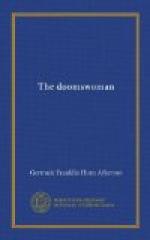“My brother is to be arrested, you say?”
“Yes.”
“And at your suggestion?”
“Yes.”
“And he may die?”
“Possibly.”
“Nothing would have been done if it had not been for you?”
“Nothing.”
“God of my life! Mother of God! how I hate you!”
“It is war, then?”
“I would kill you if I were not a Catholic.”
“I will make you forget that you are a Catholic.”
“You have made me remember it to my bitterest sorrow. I hate you so mortally that I cannot go to confession: I cannot forgive.”
“I hope you will continue to hate for a time. Now listen to me. You have several reasons for hating me. My house is the enemy of yours. I am to all intents and purposes an American; you can consider me as such. I have that indifference for religious superstition and intolerance for religion’s thraldom which all minds larger of circumference than a napkin-ring must come to in time. I have endangered the life of your brother, and I have opposed and shall oppose him in his political aspirations; he has my unequivocal contempt. Nevertheless, I tell you here that I should marry you were there five hundred reasons for your hatred of me instead of a paltry five. I shall take pleasure in demonstrating to you that there is a force in the universe a good deal stronger than traditions, religion, or even family ties.”
His eyes were not those of a lover; they shone like steel. His mouth was forbidding. She drew back from him in terror, then struck her hands together passionately.
“I marry you!” she cried. “An Estenega! A renegade? May God cast me out of heaven if I do! There, I have sworn! I have sworn! Do you think a Catholic would break that vow? I swear it by the Church,—and I put the whole Church between us!”
“I told you just now that I would make you forget your Church.” He caught her hand and held it firmly. “A last word,” he said “Your brother’s life is safe: I promise you that.”
“Let me go!” she said. “Let me go! I fear you.” She was trembling; his warmth and magnetism had sprung to her shoulder.
He gave her back her hand. “Go,” he said: “so ends the first chapter.”
X.
Casa Grande,[A] the mansion of the Iturbi y Moncadas in Santa Barbara, stood at the right of the Presidio, facing the channel. A mile behind, under the shadow of the gaunt rocky hills curving about the valley, was the long white Mission, with its double towers, corridor of many arches, and sloping roof covered with red tiles. Between was the wild valley where cattle grazed among the trees and the massive bowlders. The red-tiled white adobe houses of the Presidio and of the little town clustered under its wing, the brown mud huts of the Indians, were grouped in the foreground of the deep valley.




